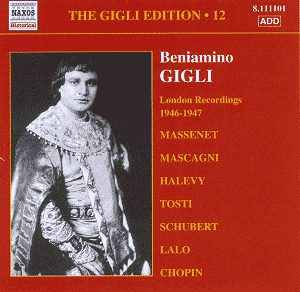|

BUY NOW
Crotchet
|
The Gigli Edition : Vol. 12 - The
London Recordings 1946-1947
Fromental HALÉVY (1799 – 1862)
La Juive: Rachel, quand du Seigneur* [4:49]
Edouard LALO (1823 – 1892)
Le Roi d’Ys: Puisqu’on ne peut … Vainement
[ma] ô bien-aimée* [3:27]
Paolo TOSTI (1846 – 1916)
Parted* [3:27]
Alan MURRAY (1890-1952)
I’ll walk beside you* [2:41]
Salvatore CARDILLO (1874-1947)
Core ’ngrato* [3:59]
Jules MASSENET (1842 – 1912)
Manon: Je suis seul! … Ah! Fuyez, douce image;* [4:44]
Werther: Pourquoi me
réveiller?* [3:08]
Rodolfo FALVO (1873-1937)
Dicitencello vuje* [3:19]
Traditional
Adeste fideles** [2:44]
Franz GRUBER (1787 – 1863)
Silent night, holy night** [2:32]
Franz SCHUBERT (1797 – 1828)
Ave Maria** [4:27]
Pietro MASCAGNI (1863 – 1945)
Cavalleria rusticana: O Lola (Siciliana)*** [2:47]
Fryderyk CHOPIN (1810 – 1849)
Reviens mon amour (from Étude in E major Op.
10 No. 3) [Tristesse]** [2:34]
Santiago CITTADINI (18??-19??)
Ninna nanna** [2:58]
Paolo TOSTI (1846 – 1916)
Segreto** [4:44]
Santiago CITTADINI (18??-19??)
Nostalgia d’amore** [3:21]
Alberto WILLIAMS (1862-1952)
Vidalita, Op. 45 No. 3** [2:49]
Carlos Lopez BUCHARDO (1881-1948)
Canción del Carretero (from Seis Canciónes al estilo popular)**
[3:22]
May BRAHE (1885 - 1956)
Bless this house** [2:50]
Arthur A. PENN (1876-1941)
Smilin’ through** [2:23]
 Beniamino Gigli (tenor) Beniamino Gigli (tenor)
*Royal Opera House Orchestra, Covent Garden/Rainaldo Zamboni; **Orchestra/Rainaldo
Zamboni, with chorus, Herbert Dawson, organ, and Kitty Wilson, harp; ***
with Kitty Wilson (harp).
rec. Studio: 4 December 1946, Abbey Road, London, (tr. 1 – 4); 13 December
1946, Kingsway Hall, London (tr. 5 – 8); 26 November, 1947, Kingsway Hall,
London (tr. 9 – 12); 27 November 1947, Kingsway Hall, London (tr. 13 –
16); 30 November, 1947, Studio 1, Abbey Road, London, (tr. 17 – 20).
 NAXOS 8.111101
[67:05] NAXOS 8.111101
[67:05]
|
Error processing SSI file
|

